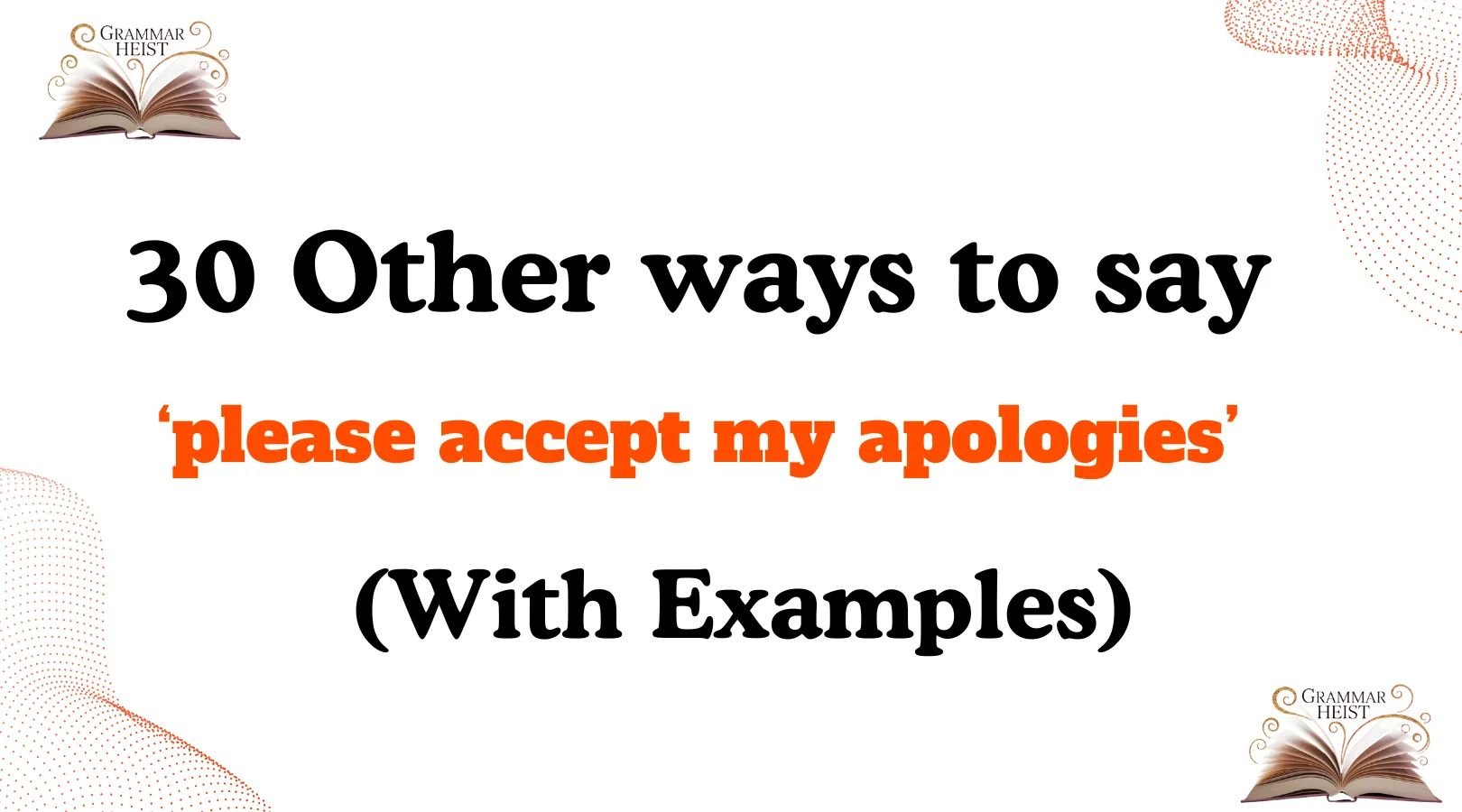Finding the right words to apologize can make a world of difference. Sometimes, the phrase “please accept my apologies” might sound too formal, distant, or repetitive. By choosing warmer, thoughtful alternatives, you show sincerity and make your message feel more personal and meaningful. Below are 30 heartfelt alternatives to help you express care, humility, and genuine regret in both personal and professional settings.
What Does “please accept my apologies” Mean?
The phrase “please accept my apologies” is a formal way of expressing regret and acknowledging a mistake. It asks the other person to receive your apology with understanding, signaling that you value the relationship and want to make amends.
Is It Professional/Polite to Say “please accept my apologies”?
Yes, it is considered both professional and polite. However, in casual settings, it may sound too stiff or distant. In personal conversations, using softer and warmer alternatives can make the sentiment feel more genuine and compassionate.
Pros or Cons
Pros:
- Shows politeness and respect.
- Professional in workplace or formal contexts.
- Universally understood.
Cons:
- Can feel too formal in casual conversations.
- May sound rehearsed or impersonal.
- Overuse can make it lose emotional weight.
Synonyms For please accept my apologies
- I’m truly sorry
- I deeply regret what happened
- Forgive me
- I owe you an apology
- My sincerest apologies
- Please forgive me
- I apologize sincerely
- I take full responsibility
- I’m ashamed of my mistake
- I regret my actions
- I made a mistake
- My bad
- I regret the inconvenience
- That was wrong of me
- I shouldn’t have done that
- I feel terrible about this
- I was wrong
- Please accept my regret
- I take the blame
- I know I hurt you, and I’m sorry
- My apologies
- I beg your pardon
- I’ll make it right
- I regret letting you down
- I shouldn’t have said that
- That was insensitive of me
- I didn’t mean to upset you
- I’ll do better next time
- I was careless
- I didn’t handle that well
1. I’m truly sorry
Scenario: Used in both personal and professional situations when you want to show heartfelt regret.
Examples:
- “I’m truly sorry for the confusion I caused.”
- “I’m truly sorry if my words hurt you.”
- “I’m truly sorry for being late to the meeting.”
Tone: Warm, direct, and genuine.
Explanation: Saying “I’m truly sorry” adds emphasis to your regret, showing the depth of your sincerity.
2. I deeply regret what happened
Scenario: Appropriate in formal emails, letters, or when acknowledging serious mistakes.
Examples:
- “I deeply regret what happened during our discussion yesterday.”
- “I deeply regret what happened and the inconvenience it caused.”
- “I deeply regret what happened and assure you it won’t happen again.”
Tone: Formal, sincere.
Explanation: This phrase emphasizes responsibility and seriousness, useful in business or official settings.
3. Forgive me
Scenario: Best for personal, heartfelt conversations where vulnerability matters.
Examples:
- “Forgive me for forgetting your special day.”
- “Forgive me, I didn’t mean to hurt you.”
- “Forgive me for raising my voice earlier.”
Tone: Emotional, humble.
Explanation: Asking for forgiveness shows vulnerability and a genuine desire for reconciliation.
4. I owe you an apology
Scenario: Used when you realize you’ve wronged someone and want to admit responsibility.
Examples:
- “I owe you an apology for missing your call.”
- “I owe you an apology for not keeping my word.”
- “I owe you an apology for reacting harshly.”
Tone: Honest, accountable.
Explanation: This phrase highlights ownership of your mistake, making it clear you accept responsibility.
5. My sincerest apologies
Scenario: A professional yet warm phrase suitable for business communications or formal letters.
Examples:
- “My sincerest apologies for the delay in responding.”
- “My sincerest apologies for the inconvenience caused.”
- “My sincerest apologies if I made you uncomfortable.”
Tone: Polite, respectful.
Explanation: It sounds formal but still heartfelt, making it ideal for workplace settings.
6. Please forgive me
Scenario: Personal situations where you want to emphasize humility and care.
Examples:
- “Please forgive me for being insensitive.”
- “Please forgive me, I should have called earlier.”
- “Please forgive me if I upset you unintentionally.”
Tone: Gentle, remorseful.
Explanation: This direct request shows openness and emotional sincerity.
7. I apologize sincerely
Scenario: Best for situations where formality and respect are necessary.
Examples:
- “I apologize sincerely for missing the deadline.”
- “I apologize sincerely if my words caused confusion.”
- “I apologize sincerely for the error in the report.”
Tone: Respectful, professional.
Explanation: A polished way to apologize while showing seriousness and responsibility.
8. I take full responsibility
Scenario: Appropriate when you want to stress accountability in professional or personal matters.
Examples:
- “I take full responsibility for the mistake in the project.”
- “I take full responsibility for not informing you earlier.”
- “I take full responsibility for how my actions made you feel.”
Tone: Accountable, confident.
Explanation: This phrase emphasizes ownership and maturity, strengthening trust.
9. I’m ashamed of my mistake
Scenario: Used in personal contexts when showing vulnerability.
Examples:
- “I’m ashamed of my mistake, and I hope you can forgive me.”
- “I’m ashamed of my mistake and the hurt it caused.”
- “I’m ashamed of my mistake and I’ll work to fix it.”
Tone: Humble, emotional.
Explanation: Expresses regret with deep honesty and remorse.
10. I regret my actions
Scenario: Suitable when acknowledging specific behavior.
Examples:
- “I regret my actions yesterday.”
- “I regret my actions and the pain they caused you.”
- “I regret my actions and will do better moving forward.”
Tone: Honest, reflective.
Explanation: Focuses on personal growth and accountability.
11. I made a mistake
Scenario: Simple and clear—great for both personal and professional use.
Examples:
- “I made a mistake in the report, and I’ll correct it.”
- “I made a mistake and I’m sorry for upsetting you.”
- “I made a mistake, and I’ll make sure it doesn’t happen again.”
Tone: Honest, straightforward.
Explanation: This phrase strips away formality and shows direct accountability without overcomplicating things.
12. My bad
Scenario: Informal and casual; best for light mistakes among friends or close colleagues.
Examples:
- “Oh, my bad! I forgot to send the file.”
- “My bad, I didn’t realize you were waiting for me.”
- “That was my bad, I should’ve double-checked.”
Tone: Casual, relaxed.
Explanation: It downplays the mistake but still accepts responsibility in a friendly way.
13. I regret the inconvenience
Scenario: Professional emails, especially when acknowledging delays or issues.
Examples:
- “I regret the inconvenience caused by the late delivery.”
- “I regret the inconvenience this situation has brought you.”
- “I regret the inconvenience and thank you for your patience.”
Tone: Polite, businesslike.
Explanation: A softer phrase, often used in customer service or professional environments.
14. That was wrong of me
Scenario: Personal conversations when you want to admit fault clearly.
Examples:
- “That was wrong of me to speak like that.”
- “That was wrong of me, and I hope you can forgive me.”
- “That was wrong of me not to support you when you needed it.”
Tone: Honest, regretful.
Explanation: This phrasing shows humility and acknowledges wrongdoing directly.
15. I shouldn’t have done that
Scenario: When reflecting on poor judgment in personal or professional matters.
Examples:
- “I shouldn’t have done that—I’m sorry.”
- “I shouldn’t have done that without asking you first.”
- “I shouldn’t have done that, and I’ll make it right.”
Tone: Reflective, sincere.
Explanation: Highlights awareness and growth from the mistake.
16. I feel terrible about this
Scenario: Personal situations where you want to express deep regret emotionally.
Examples:
- “I feel terrible about this misunderstanding.”
- “I feel terrible about this and the way it made you feel.”
- “I feel terrible about this and want to make amends.”
Tone: Emotional, remorseful.
Explanation: Expresses empathy and shows emotional connection to the person affected.
17. I was wrong
Scenario: Short, powerful admission of fault, great in personal conversations.
Examples:
- “I was wrong to doubt you.”
- “I was wrong and I should have listened.”
- “I was wrong, and I’ll admit it.”
Tone: Direct, humble.
Explanation: This simple phrase can be very disarming because of its honesty.
18. Please accept my regret
Scenario: Slightly formal, often in written communication.
Examples:
- “Please accept my regret for the error.”
- “Please accept my regret for the delay.”
- “Please accept my regret for the miscommunication.”
Tone: Formal, polite.
Explanation: Feels less stiff than “please accept my apologies,” while staying professional.
19. I take the blame
Scenario: Used when you want to show strong accountability in team or work settings.
Examples:
- “I take the blame for the oversight.”
- “I take the blame for the scheduling issue.”
- “I take the blame and will ensure it’s fixed.”
Tone: Responsible, confident.
Explanation: Builds trust and leadership credibility by not shifting fault.
20. I know I hurt you, and I’m sorry
Scenario: Personal, emotional situations where feelings were involved.
Examples:
- “I know I hurt you, and I’m sorry for what I said.”
- “I know I hurt you, and I’ll do better.”
- “I know I hurt you, and I regret it deeply.”
Tone: Empathetic, heartfelt.
Explanation: Acknowledges the impact of your actions directly, which builds healing.
21. My apologies
Scenario: Polite and slightly formal, good for daily professional interactions.
Examples:
- “My apologies for not attending.”
- “My apologies for the delay.”
- “My apologies if I misunderstood.”
Tone: Neutral, respectful.
Explanation: Short, professional, and widely acceptable in business settings.
22. I beg your pardon
Scenario: Old-fashioned but still polite; often used when interrupting or making a small mistake.
Examples:
- “I beg your pardon, I didn’t mean to step on your foot.”
- “I beg your pardon for interrupting.”
- “I beg your pardon, could you repeat that?”
Tone: Polite, traditional.
Explanation: Works for light mistakes or in very formal settings.
23. I’ll make it right
Scenario: Shows both apology and action, great in professional or personal settings.
Examples:
- “I’ll make it right by correcting the mistake immediately.”
- “I’ll make it right and take care of the issue today.”
- “I’ll make it right with a proper explanation.”
Tone: Solution-focused, responsible.
Explanation: Moves beyond apology to show commitment to fixing the problem.
24. I regret letting you down
Scenario: Best used in personal or emotional situations.
Examples:
- “I regret letting you down yesterday.”
- “I regret letting you down when you needed me.”
- “I regret letting you down and not being present.”
Tone: Vulnerable, heartfelt.
Explanation: Highlights personal accountability and emotional awareness.
25. I shouldn’t have said that
Scenario: Acknowledges verbal mistakes, especially in conflicts.
Examples:
- “I shouldn’t have said that during our argument.”
- “I shouldn’t have said that—it was unfair.”
- “I shouldn’t have said that, and I regret it.”
Tone: Honest, direct.
Explanation: Pinpoints specific wrongdoing and shows self-reflection.
26. That was insensitive of me
Scenario: When acknowledging lack of empathy in words or actions.
Examples:
- “That was insensitive of me, and I regret it.”
- “That was insensitive of me to joke about.”
- “That was insensitive of me, please forgive me.”
Tone: Gentle, empathetic.
Explanation: Demonstrates awareness of how your words affected someone.
27. I didn’t mean to upset you
Scenario: Works when intentions were harmless but caused hurt.
Examples:
- “I didn’t mean to upset you, and I’m sorry.”
- “I didn’t mean to upset you with my comment.”
- “I didn’t mean to upset you—I’ll be more careful.”
Tone: Soft, explanatory.
Explanation: Emphasizes unintentional impact, balancing apology with reassurance.
28. I’ll do better next time
Scenario: Shows growth and improvement after mistakes.
Examples:
- “I’ll do better next time and prepare in advance.”
- “I’ll do better next time—I’ve learned from this.”
- “I’ll do better next time and not repeat this error.”
Tone: Optimistic, responsible.
Explanation: Communicates learning and accountability.
29. I was careless
Scenario: Used when admitting lack of attention caused a problem.
Examples:
- “I was careless with the documents.”
- “I was careless and didn’t check properly.”
- “I was careless, and I’ll fix it.”
Tone: Honest, self-critical.
Explanation: Shows humility and acknowledges negligence.
30. I didn’t handle that well
Scenario: Reflective phrase for handling conflict or communication poorly.
Examples:
- “I didn’t handle that well during our talk.”
- “I didn’t handle that well, and I owe you an apology.”
- “I didn’t handle that well, but I’ll learn from it.”
Tone: Reflective, sincere.
Explanation: Shows self-awareness and willingness to improve.
Conclusion
Apologies are not one-size-fits-all. The phrase “please accept my apologies” is polite, but sometimes we need warmer, more heartfelt expressions that show accountability, empathy, or even action. Whether in a professional email or a heartfelt personal conversation, the right words can heal misunderstandings and strengthen relationships. Choose the alternative that best matches the situation, and your apology will feel both authentic and meaningful.

Emma Rose is a dedicated writing expert with a passion for helping others enhance their communication skills. With a strong background in grammar, language structure, and style, Emma empowers individuals to write with clarity, confidence, and impact. Her approach combines a keen attention to detail with a supportive, personalized touch, ensuring each person she works with improves and grows in their writing journey.













